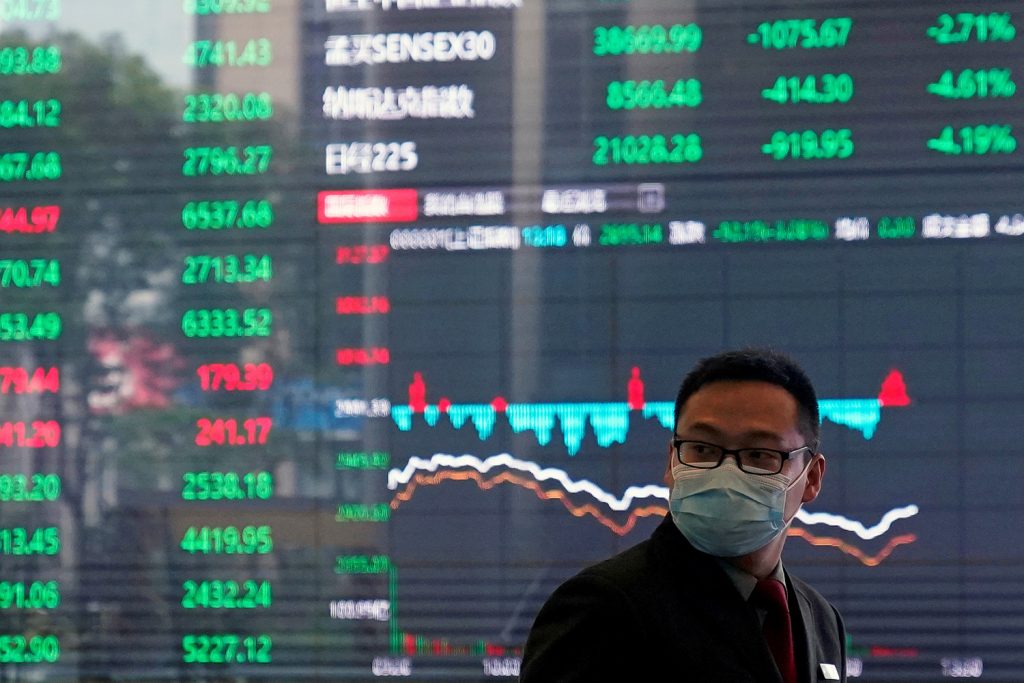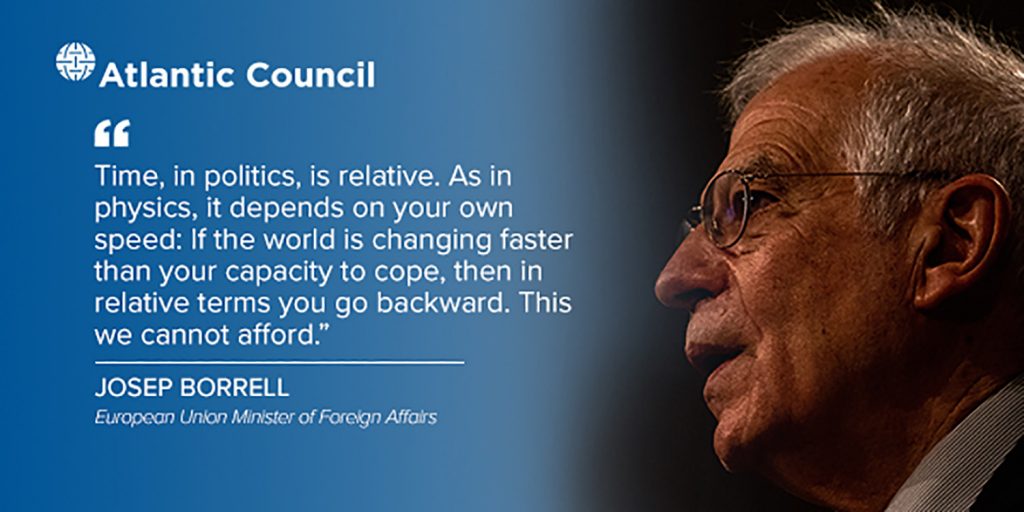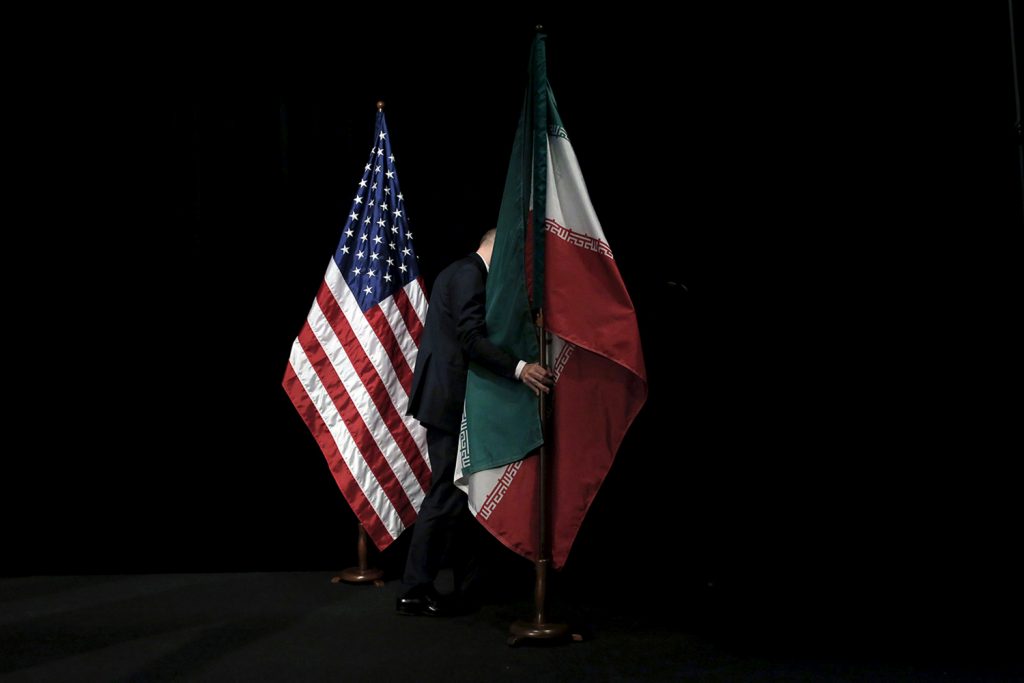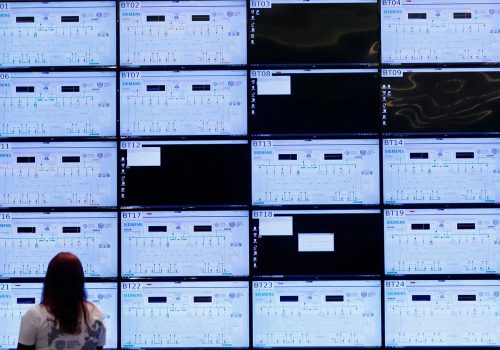Imagine President-elect Biden standing before two doors that represent the Middle Eastern quandary he faces. The choice he makes will not only color his administration but have a historic impact on the world’s most booby-trapped region.
One door is marked “Return to Obama’s Iran Nuclear Deal.”
The other is labelled “Build Upon Trump’s Abraham Accords.”
Literature is littered with confounding two-door parables and allegories, from Jesus’ Sermon on the Mount, where the choice is between the wider or the more narrow and difficult road, to Frank R. Stockton’s 1882 short story, “The Lady, or the Tiger?” where two soundproofed doors lay before the lover of the king’s daughter.
As it is with most of these tales, there are perils in both paths.
Get the Inflection Points newsletter
Subscribe to Frederick Kempe’s weekly Inflection Points column, which focuses on the global challenges facing the United States and how to best address them.
Democratic party politics and campaign promises would suggest that President-elect Biden move quickly toward a return to the nuclear agreement, known as the JCPOA, a signature achievement for the man who picked him as vice president. President Trump withdrew from that agreement in May 2018, calling it “the worst deal ever.”
The wiser course would be to move slowly, cautiously and with trepidation toward the Iran door, recognizing how much has changed in the Middle East in the four years since President Obama left office.
The Obama deal, which never was blessed by a congressional vote, didn’t address Iran’s regional misbehavior or its progress in ballistic missile and advanced weapons development, which negotiators left for a later day.
Those advances were on display in Iran’s September 2019 Iranian cruise missile and drone strikes on Saudi oil fields and its ballistic missile attacks on U.S. military positions in Iraq on January 8, 2020, in answer to the drone attack that had killed Iranian General Qasem Solemani five days earlier.
Beyond that, today’s Iran is unlikely to rush back into compliance with the agreement in the run-up to its June elections, in which the hardliners are determined to further marginalize so-called moderates. Having accumulated more enriched uranium and installed more advanced centrifuges than the JCPOA would allow, Iran’s leaders won’t abandon those gains easily.
Much as they may want an easing of economic sanctions against them, Iran’s hardliners also want more: compensation for all they lost economically over the past four years because of renewed U.S. sanctions. Unsaid is that each day provides them more time to develop their nuclear capabilities further, either as leverage for future talks or making inevitable their nuclear weapons breakout.
The assassination in Iran of the country’s top nuclear scientist on November 27, blamed in the country on Israel and the U.S., has further inflamed tensions and requires some response. In a sign of Iran’s hardening mood, the government just today executed dissident Iranian journalist Ruhollah Zam.
So, there’s no easy path to a good deal. President Biden is unlikely to provide the fast relief and compensation Iran demands. Iran is unlikely to return to the agreement’s strictures unless it gets what it wants, and until then it won’t address issues outside the existing agreement that have become more urgent.
That leaves Door Number Two.
This is the one President-elect Biden should walk through as soon as he enters office. Biden himself has indicated this could be the one Trump foreign policy achievement he would wish to build upon.
President-elect Biden praised the accords from the campaign trail before they were signed at the White House this September by Bahraini, Israeli and UAE leaders. Morocco this week joined the U.S.-brokered agreement with Israel, after Sudan had done so in October.
As Axios reported this week, President-elect Biden could leverage this Arab-Israeli momentum, but he would do so differently than Trump.
“He wants to use that dynamic to reflect some positive momentum back into the Israeli-Palestinian deal,” said Dan Shapiro, the former U.S. ambassador to Israel under Obama.
Most crucial to watch is Saudi Arabia. Conventional wisdom has it that President-elect Biden, who has said he would reassess relations with Riyadh, will create greater distance and sharpen the focus on Saudi Arabia’s remaining human rights failings.
Yet Riyadh has a vote here as well.
Should King Abdullah and Crown Prince Mohammed Bin Salman act to release the high-profile women’s rights activists who remain in prison, repair relations with Qatar through ongoing Kuwaiti moderation, and further liberalize relations to Israel, the atmosphere could improve considerably.
The assassination by Saudi government agents of journalist Jamal Khashoggi in October 2018 remains a toxic impediment, but Riyadh has the potential to change that context dramatically.
Just as the UAE leveraged its agreement with Israel to stop Israel’s annexation of the West Bank, a Saudi deal to join the accords under a Biden administration could be linked to the two-state solution.
There’s a larger reason for President-elect Biden to choose Door Number Two: as a basis for institutional and strategic change in the Middle East.
The little-noticed seventh paragraph of the Abraham Accords states, “The Parties stand ready to join with the United States to develop and launch a ‘Strategic Agenda for the Middle East’ in order to expand regional diplomatic, trade, stability and other cooperation.”
Add Egypt and Jordan, countries that already have peace deals with Israel, and there’s a shot at a modernist, moderate Mideast coalition of countries focused on future opportunities rather than the settling of old scores.
From that basis, one could encourage the sort of economic and security institutions and integration that unlocked European potential after World War II. Even today, those institutions haven’t achieved the “Europe Whole and Free” that was President George H.W. Bush’s dream, with Russia and others remaining outside.
However, no one could argue that Europe would have been better off without partial solutions.
There’s also an urgent need to provide an alternative strategic future to those being offered by Iran, Turkey, Russia and China. Better yet if that strategic shift is accompanied by expanding individual freedoms, increased opportunities for youth and women, and reduced inter-religious tensions.
“The more these changes bring about personal and economic opportunity in the region, the more Iran’s population will want to benefit from them,” says Kirsten Fontenrose, director of the Scowcroft Middle East Security Initiative at the Atlantic Council.
Returning to President-elect Biden’s two-door predicament: the best way to improve his chances at a lasting Iran solution may be through the back entrance of the Abraham Accords.
This article originally appeared on CNBC.com
Frederick Kempe is president and chief executive officer of the Atlantic Council. You can follow him on Twitter @FredKempe.

THE WEEK’S TOP READS
Three of this week’s top-reads, read as a package, are must-reads on China’s rise as well as its fragility.
Former Treasury Secretary Hank Paulson in a WSJ op-ed warns us of China’s threat, and of the threat of our own debt levels, to U.S. predominance. On the WSJ front page, Lingling Wei richly describes President Xi Jinping’s assault on the Chinese private sector. And the FT “Big Read” this weekend argues that the wheels are falling off China’s audacious Belt and Road Initiative.
European Union Foreign Minister Josep Borrell, writing in Foreign Policy, continues the EU’s concerted outreach to the Biden administration with security policy, China and Iran as priorities.
Last week’s edition of Inflection Points argued that President-elect Biden has the rare opportunity to be a transformative president. The last of this week’s top reads is David Ignatius’s appeal in the Washington Post to bring more vision and contrarian thinking into his “comfort cabinet.” That will be necessary if Biden is to achieve his historic potential.
#1. CHINA’S BANKING CHALLENGE
China Wants to Be the World’s Banker
Henry M. Paulson Jr. / THE WALL STREET JOURNAL
Hank Paulson has a rare combination of talents: he knows today’s China as the chairman of the Paulson Institute; the role of banking from his time as chairman and CEO of Goldman Sachs; and international finance as the 74th United States secretary of the treasury.
So it’s worth reading his WSJ op-ed on what the Biden administration needs to do to maintain U.S. financial pre-eminence in the face of China’s rise and “shortsighted and counterproductive policies at home” that are undermining the American position.
“A world-class financial system can’t exist in a country that fails to maintain the quality of its credit,” writes Paulson, underscoring the lack of political will to deal with the United States’ structural deficit. “When the pandemic passes, it is critically important to bend down the steep trajectory of the rising national debt. Otherwise, the dollar will eventually be debased. Washington won’t be able to pay its bills.” Read More →
#2. PRESIDENT XI VS. PRIVATE ECONOMY
China’s Xi Ramps Up Control of Private Sector. ‘We Have No Choice but to Follow the Party.’
Lingling Wei / THE WALL STREET JOURNAL
President Xi Jinping, “long distrustful of the private sector, is moving assertively to bring it to heel,” writes Lingling Wei in one of those must-read page-one WSJ features that captures in rich, anecdotal detail a monumental shift.
Writes Wei, “The push is driven by a deepening conviction within the country’s leadership that markets and private entrepreneurs, while important to China’s rise, are unpredictable and not to be fully trusted. The view that state planners are better at running a complex economy has gained currency this year, with Beijing relying heavily on state directives to engineer a V-shaped recovery from the shock of Covid-19.”
The risk is that Xi’s moves could “dull the kind of innovation, competitive spirit and unbridled energy that powered China’s explosive growth in recent decades.” The economic policies that helped nurture Chinese giants like Alibaba and Tencent Holdings have ended, and a new approach is following that will require more capital to achieve the same growth. Read More →
#3. CHINA’S FIRST OVERSEAS DEBT CRISIS?
China pulls back from the world: rethinking Xi’s ‘project of the century.’
James Kynge and Jonathan Wheatley / FINANCIAL TIMES
James Kynge and Jonathan Wheatley devote the Weekend FT’s “Big Read” to a big problem for Chinese leaders. “It has not taken long for the wheels to come off the Belt and Road Initiative,” they write.
If true, that would mean President Xi Jinping’s “project of the century” could be “unravelling into what could become China’s first overseas debt crisis,” they write. China has promised to spend about $1 trillion on building infrastructure—roughly seven times the size of the Marshall Plan in today’s dollars—mostly in developing countries around the world.
What seems to be happening instead is that China will have to decide how much debt to reschedule and how much to forgive as its partners find themselves unable to repay. That could also result in a fundamental rethink of China toward more lending through multilateral bodies and international lending agencies.
One could view this as no more than the growing pains of a world power. Alternatively, some Chinese officials may wonder if President Xi’s hubris may have got the best of him. Read More →
#4. A TRANSATLANTIC MOMENT
How to Kick-Start a New Trans-Atlantic Era
Josep Borrell / FOREIGN POLICY
Just in case the United States missed the European Commission’s offer last week of an audacious global partnership for the future, the EU’s top foreign policy official drove home the urgency of the effort in Foreign Policy this week.
“No other pair on the international stage can match the partnership between the European Union and the United States,” he writes. “Neither Europe nor America will find a major partner that is more aligned and more powerful. After a rocky four years, it is time for a fresh start. The election of Joe Biden as U.S. president gives us the chance to make it happen.”
He accompanies it with a warning: “What is striking is that our capacity to find solutions has not kept pace with the speed and scope of change. Time, in politics, is relative. As in physics, it depends on your own speed: If the world is changing faster than your capacity to cope, then in relative terms you go backward. This we cannot afford.” Read More →
#5. BIDEN’S “VISION” CHALLENGE
Biden is picking a Cabinet built for comfort. What he needs is vision.
David Ignatius / WASHINGTON POST
David Ignatius points to the one attribute that may be lacking in Biden’s cabinet selections so far: vision. He praises the “comfort level” cabinet that President-elect Biden has picked thus far, full of competence, experience and familiarity. That’s a welcome contrast with Trumpian cabinet dysfunctions, but it may be insufficient for our times.
“Biden should add intellectual firepower with some contrarians who’ll urge him to take risks,” writes Ignatius. “Professors, think-tank chiefs, top executives at our best technology and consulting companies who can help rethink policy toward Russia, China and other countries, perhaps as ambassadors. Bringing on such luminaries would accelerate Biden’s takeoff.”
“Biden’s challenge is that after cooling the national fever, literally and figuratively, he needs to shake things up,” Ignatius writes. He outlines four areas where he needs that creative thinking most urgently: racial justice, economic justice, the intelligence community and inside the Pentagon. One early test will be to watch Lloyd Austin as Secretary of Defense, who comes in lacking the weapons and strategy to take on China.
“If Austin is the right person to lead this transformative effort, he needs to show it,” writes Ignatius. Read More →
QUOTE OF THE WEEK

Atlantic Council top reads
Image: REUTERS/Carlos Barria/File Photo



